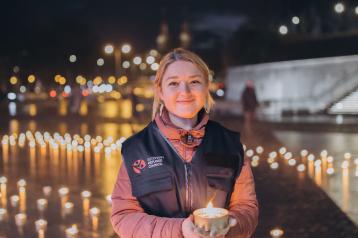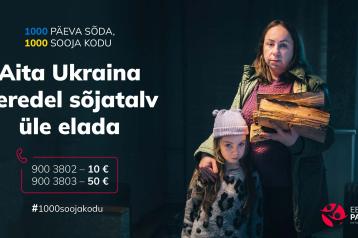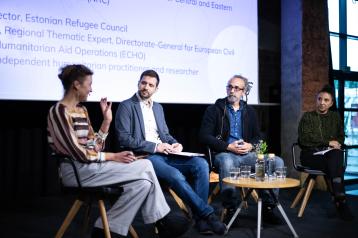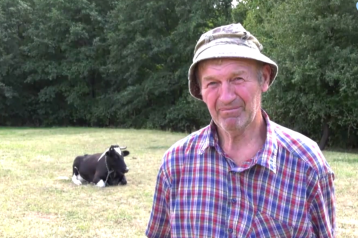Countries
As the war escalated, the number of requests to the Estonian Refugee Council increased significantly. Our employees' phones rang 24/7 and questions were asked on all sorts of imaginable and unthinkable topics. Most callers were people who wanted to escape from Ukraine or who had already arrived in Estonia, and from helpful Estonians. There was a lot of confusion in the first few weeks, and many burning questions were unanswered. However, even with limited information, we considered it important to reassure people who were concerned, by providing a timeframe for possible answers or by simply listening to them.
Call centre and email inquiries

In March, we opened an Estonian call centre, as the number of inquiries increased to hundreds of calls per hour in the first days. We received 2,698 calls in March, 1,207 in April, and the number of calls in May reached approximately 800 for the month. The call centre has been open every day from Monday to Sunday with the support of volunteers.
We opened an e-mail address dopomoha@pagulasabi.ee, where 20 requests for help or questions about obligations, opportunities and rights are received every day on average, and which our volunteers also help to keep working.
Counselling centre
With the support of new employees and volunteers, our office has been open from 28 February, Monday to Friday 10:00-17:00 to support war refugees who have arrived in Estonia.

To support the Ukrainian refugees, we quickly included new volunteers. During the first weeks, more than 30 volunteers were involved in the counselling team on a weekly basis. They all wished to make the adaptation of war refugees arriving in Estonia as smooth and safe as possible. All our volunteers were given the opportunity to improve their knowledge and skills to provide psychosocial support, they learned to recognise the risks of human trafficking and acquired a considerable amount of important information to guide those in need.
From March to mid-May, our volunteers have contributed 3,160 valuable hours of work. Our expectations of volunteers were quite high, because in addition to being motivated and proficient in Russian, we wanted them to contribute at least one day a week so that they could keep up with the rapidly changing field of information. The relevancy and up-to-date nature of information provided was the daily responsibility of the five-member volunteer team who updated the frequently asked questions data file. They also went through the authorities' websites and communicated directly with the officials to obtain further information.

Until the second half of April, an average of 20–30 households turned to the Estonian Refugee Council for advice on finding food, clothes, housing and other essentials. It is estimated that approximately 2,600 people, or about a quarter of the refugees who have arrived in Tallinn, have approached us.
Mediation of housing
We also involved volunteers in mediating housing provided by Estonian people for war refugees. With the help of regional coordinators, we created on-site volunteer teams in Pärnu and Tartu, who went to introduce long-term accommodation options for refugees accommodated in hotels by the Social Insurance Board. As of 31 May, we have mediated 916 living quarters for long-term accommodation of refugees, which means we have provided accommodation for at least 3,200 people and has created an opportunity for these families to move on with their independent lives.
Work goes on
Although the country’s information channels and workflows have become clearer and fewer people turn to the Estonian Refugee Council, our counselling centre is still in constant operation. Thanks to the reduced number of calls, volunteers can approach each problem more personally and provide more support to those in need. Often, the problems have become even more multi-layered, because the decisions made in the initial confusion and lack of information have led to many refugees experiencing both lost savings, resentment or mental anguish. We have taken the time to sit back, have a cup of tea and provide a supportive shoulder to the war refugees who visit our office. Even if we cannot always reduce the negativity and hopelessness that comes with war and homesickness, we can add a bit of positivity to the lives of every refugee with a kind word and an encouraging smile.







